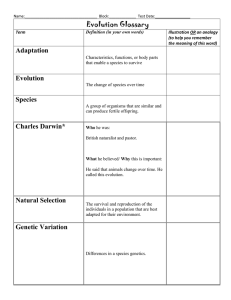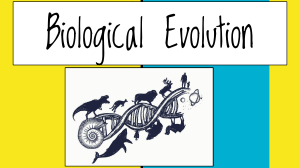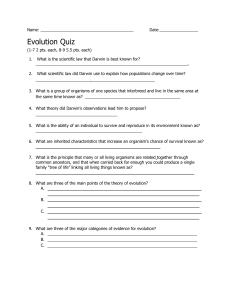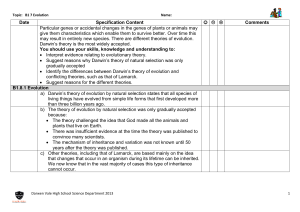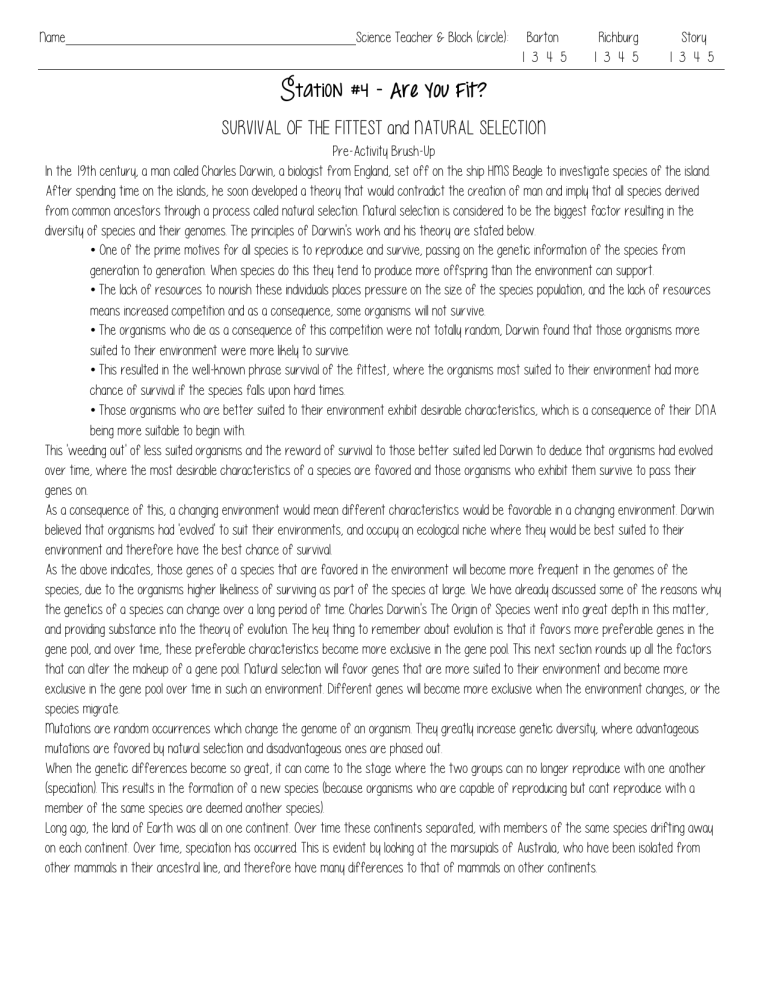
Name Science Teacher & Block (circle): Barton 1 3 4 5 Richburg 1 3 4 5 Story 1 3 4 5 Station #4 – Are You Fit? SURVIVAL OF THE FITTEST and NATURAL SELECTION Pre-Activity Brush-Up In the 19th century, a man called Charles Darwin, a biologist from England, set off on the ship HMS Beagle to investigate species of the island. After spending time on the islands, he soon developed a theory that would contradict the creation of man and imply that all species derived from common ancestors through a process called natural selection. Natural selection is considered to be the biggest factor resulting in the diversity of species and their genomes. The principles of Darwin's work and his theory are stated below. • One of the prime motives for all species is to reproduce and survive, passing on the genetic information of the species from generation to generation. When species do this they tend to produce more offspring than the environment can support. • The lack of resources to nourish these individuals places pressure on the size of the species population, and the lack of resources means increased competition and as a consequence, some organisms will not survive. • The organisms who die as a consequence of this competition were not totally random, Darwin found that those organisms more suited to their environment were more likely to survive. • This resulted in the well-known phrase survival of the fittest, where the organisms most suited to their environment had more chance of survival if the species falls upon hard times. • Those organisms who are better suited to their environment exhibit desirable characteristics, which is a consequence of their DNA being more suitable to begin with. This 'weeding out' of less suited organisms and the reward of survival to those better suited led Darwin to deduce that organisms had evolved over time, where the most desirable characteristics of a species are favored and those organisms who exhibit them survive to pass their genes on. As a consequence of this, a changing environment would mean different characteristics would be favorable in a changing environment. Darwin believed that organisms had 'evolved' to suit their environments, and occupy an ecological niche where they would be best suited to their environment and therefore have the best chance of survival. As the above indicates, those genes of a species that are favored in the environment will become more frequent in the genomes of the species, due to the organisms higher likeliness of surviving as part of the species at large. We have already discussed some of the reasons why the genetics of a species can change over a long period of time. Charles Darwin's The Origin of Species went into great depth in this matter, and providing substance into the theory of evolution. The key thing to remember about evolution is that it favors more preferable genes in the gene pool, and over time, these preferable characteristics become more exclusive in the gene pool. This next section rounds up all the factors that can alter the makeup of a gene pool. Natural selection will favor genes that are more suited to their environment and become more exclusive in the gene pool over time in such an environment. Different genes will become more exclusive when the environment changes, or the species migrate. Mutations are random occurrences which change the genome of an organism. They greatly increase genetic diversity, where advantageous mutations are favored by natural selection and disadvantageous ones are phased out. When the genetic differences become so great, it can come to the stage where the two groups can no longer reproduce with one another (speciation). This results in the formation of a new species (because organisms who are capable of reproducing but cant reproduce with a member of the same species are deemed another species). Long ago, the land of Earth was all on one continent. Over time these continents separated, with members of the same species drifting away on each continent. Over time, speciation has occurred. This is evident by looking at the marsupials of Australia, who have been isolated from other mammals in their ancestral line, and therefore have many differences to that of mammals on other continents. Name Science Teacher & Block (circle): Barton 1 3 4 5 Richburg 1 3 4 5 Story 1 3 4 5

